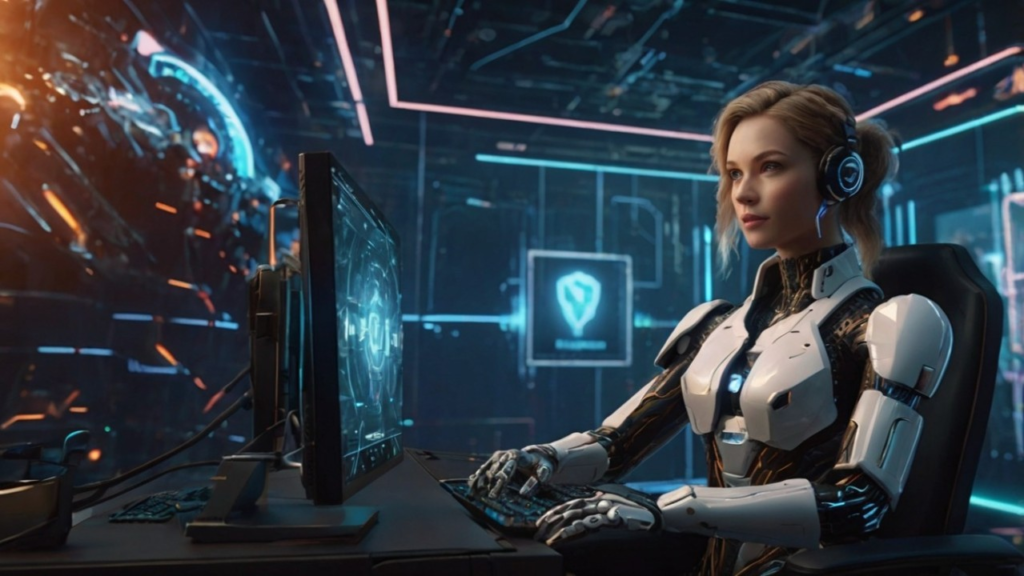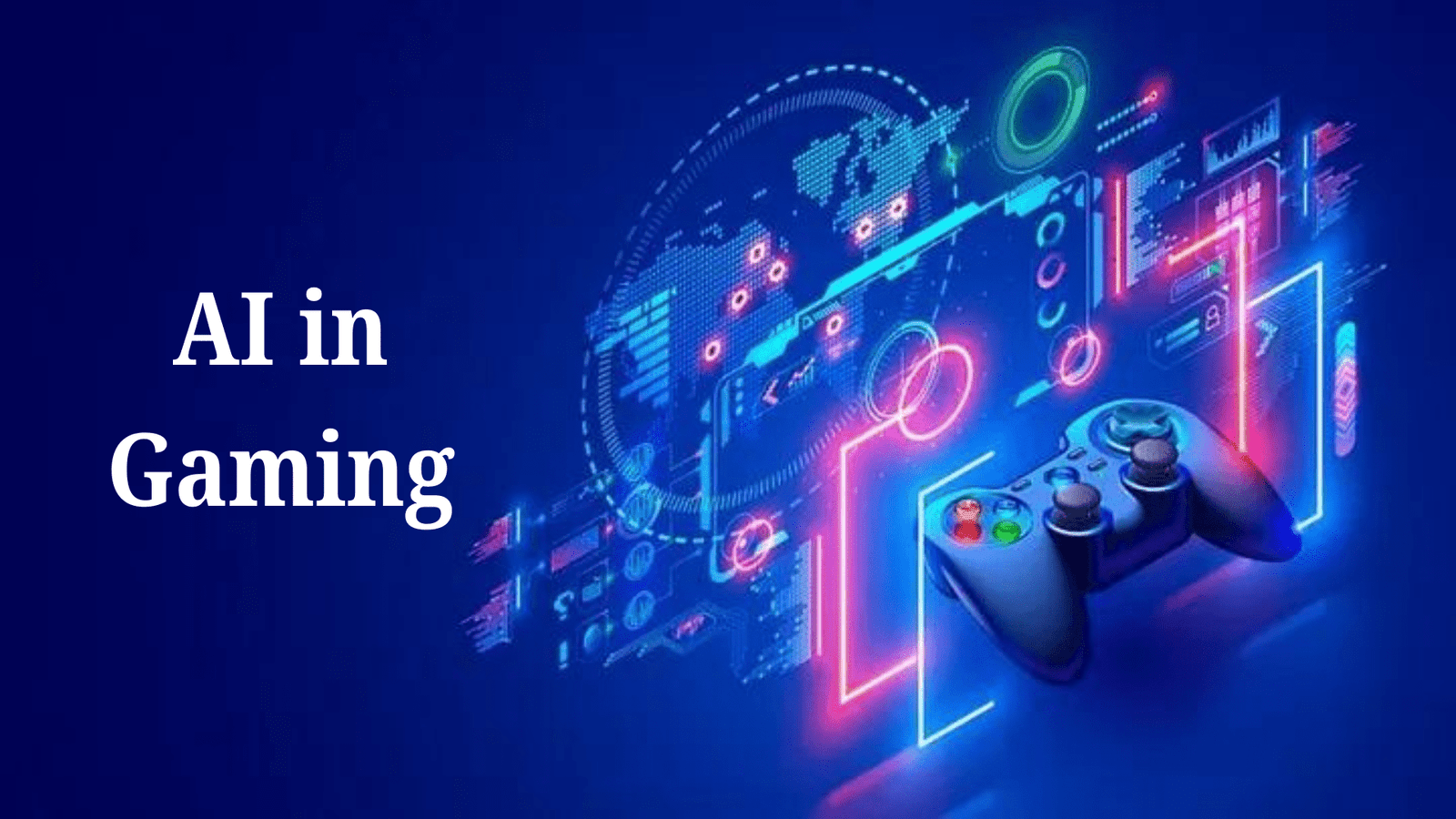Artificial Intelligence (AI) is an integral part of modern video games, evolving far beyond its original role in controlling non-playable characters (NPCs). Today, AI in games shapes the future of interactive play by driving dynamic narratives, adaptive gameplay mechanics, and enhanced player immersion. It powers everything from NPC behavior and procedural world generation to complex player decision-making and storytelling. In this article, we’ll explore the transformative role of AI in gaming, how it’s shaping player experiences, and the future of AI-driven interactive play.
Key Takeaways
- AI Revolution: AI in games has evolved from simple scripts to complex systems driving dynamic worlds, adaptive gameplay, and personalized narratives.
- Smarter NPCs: AI-powered NPCs react and adapt to players, creating more lifelike and engaging interactions.
- Procedural Generation: AI allows for infinite replayability by generating unique, procedurally created worlds and levels.
- Adaptive Gameplay: AI ensures that the difficulty and challenges in games evolve in real-time, based on the player’s actions and progress.
- Future of AI: In the future, AI will enable deeper interactions, smarter AI companions, and fully dynamic, interactive worlds.
The Rise of AI in Games

Artificial Intelligence, in the context of video games, refers to the simulation of human-like decision-making and behavior in digital environments. It influences how NPCs respond to players, how the environment reacts to changes, and how adaptive gameplay systems enhance or challenge players as they progress.
The Evolution of AI in Gaming
AI’s history in games can be traced back to the earliest video games of the 1950s and 1960s, where AI was used primarily for simple tasks like determining enemy movement or ensuring the randomness of in-game events. Early examples of AI can be seen in arcade classics like Space Invaders and Pong, where simple algorithms dictated enemy behavior and game mechanics.
Over the decades, AI in gaming has evolved into something far more complex. In the late 1980s and 1990s, games like Doom and Warcraft featured AI for enemies that adapted to player behavior, while The Sims and Grand Theft Auto brought NPCs with distinct personalities and dynamic reactions. As technology has advanced, so too have the capabilities of AI systems in games, making AI-driven worlds more immersive, responsive, and lifelike.
What is AI in Games?

AI in video games refers to the use of algorithms and machine learning models that control game behavior, NPC actions, and the dynamic nature of game environments. These systems help create responsive, adaptive gameplay experiences by simulating intelligent behavior. AI is responsible for NPC decision-making, enemy tactics, world-building, and procedural content generation.
How AI is Shaping Interactive Play
AI is rapidly transforming the way games are designed and played. It drives innovation by allowing games to become more reactive and engaging. Here are some ways AI is changing interactive play:
- Intelligent NPC Behavior:
- In earlier games, NPCs were static, predictable, and followed pre-determined paths. Today, AI allows NPCs to respond in a more lifelike manner. Games like The Elder Scrolls V: Skyrim and Red Dead Redemption 2 feature NPCs with complex routines and adaptive responses based on player interaction.
- For example, in Skyrim, NPCs react to different player actions, whether it’s committing a crime, completing a quest, or engaging in dialogue. These interactions feel more realistic and give the player a sense of agency.
- Adaptive Difficulty and Dynamic Storylines:
- AI-driven systems can adjust the difficulty level based on the player’s performance, ensuring that gameplay remains challenging but not overwhelming. Games like Left 4 Dead and The Last of Us feature AI that scales the difficulty based on player actions and gameplay style.
- AI also influences the story by creating branching narratives. Detroit: Become Human and The Witcher 3 use AI to adjust plot lines and character interactions based on player choices. This dynamic storytelling makes games feel more personalized and emotionally impactful.
- Procedural Content Generation:
- AI is also responsible for generating endless content. Games like Minecraft and No Man’s Sky use procedural generation algorithms, powered by AI, to create vast, unique worlds. This allows players to explore new environments and challenges each time they play, ensuring no two experiences are alike.
- Realistic Player Interactions:
- AI algorithms can enhance player interaction with the game world by using Natural Language Processing (NLP). This allows players to communicate with characters using voice commands or text, as seen in The Elder Scrolls V: Skyrim or AI Dungeon, where players can create and influence stories through conversational AI.
AI in Games Today: How It Shapes the Player Experience

Today, AI in games is not just about giving NPCs the ability to chase or shoot at players. It’s about creating worlds that evolve, react, and adapt to the player in real-time. Let’s dive into how AI influences modern gaming.
1. Dynamic NPC Behavior and Decision-Making
In early games, NPCs often followed simple, scripted patterns, reacting predictably when players approached. However, with the power of AI, NPCs now exhibit more sophisticated and unpredictable behaviors, contributing to a more dynamic and immersive experience.
For example, in The Elder Scrolls V: Skyrim, NPCs follow their own daily routines, interacting with each other and the environment based on time of day, weather, and other conditions. AI enables NPCs to react to the player’s actions dynamically, whether it’s fleeing from an aggressive player or aiding the player in completing quests.
In Red Dead Redemption 2, the game’s NPCs are powered by advanced AI systems that simulate deep levels of interaction. NPCs react to the player’s actions, such as becoming hostile if the player commits a crime, or even offering help when the player appears in need. The game’s AI ensures that the behavior of NPCs is unpredictable, making the world feel alive and responsive.
2. Adaptive Gameplay and Difficulty Scaling
AI has a massive impact on how games adapt to a player’s skill level. Rather than relying on static difficulty settings, many games today use adaptive AI that tailors the gameplay experience to the individual. Games like Left 4 Dead and The Last of Us adjust enemy behavior, difficulty, and world conditions based on how well the player is performing.
For example, in Left 4 Dead, the game features a system known as the AI Director, which monitors the player’s progress and adjusts the intensity of the gameplay by spawning enemies, changing the environment, and setting different objectives. The AI Director ensures that no two playthroughs are the same, providing a dynamic challenge that is suited to the player’s skill level and playstyle.
3. Procedural Generation and Dynamic Environments
AI is also driving the evolution of procedural generation, where algorithms create game content, such as maps, levels, and quests, in real-time. Games like Minecraft, No Man’s Sky, and Spelunky are examples where AI generates vast, unique worlds and environments that can be explored for countless hours.
Procedurally generated worlds are not only diverse but also respond to the player’s actions. For instance, in Minecraft, AI-controlled mobs appear in specific areas, influencing the player’s approach to exploration. AI-driven environments like these allow for unlimited replayability, creating new and exciting experiences every time the player enters the world.
4. Enhanced Player Interactions Through Natural Language Processing (NLP)
AI is enabling more realistic and interactive experiences by using Natural Language Processing (NLP) to allow players to interact with characters and environments using their voices. In games like Fallout 4 and Star Wars: Knights of the Old Republic, AI interprets player dialogue choices and adjusts the narrative and responses accordingly.
NLP is evolving, with games like AI Dungeon using GPT-3 to generate completely unique and dynamic stories based on voice or text inputs. This kind of interaction allows players to shape the world and story as they play, creating a deeper sense of agency and immersion.
5. AI and Storytelling: Crafting Personalized Narratives
AI is changing the way stories are told in games. With the help of AI-driven systems, games are now able to present players with branching narratives and choices that evolve based on their actions. Detroit: Become Human and The Witcher 3: Wild Hunt use AI to track player decisions, leading to vastly different storylines, character interactions, and outcomes.
In Detroit: Become Human, every decision you make as a player impacts the direction of the story, from minor interactions to significant plot twists. The AI ensures that every choice has a consequence, which makes the narrative experience personalized and unique to each player. This level of complexity in storytelling would be impossible without the use of advanced AI.
6. AI in Player vs. Environment (PvE) and Player vs. Player (PvP) Combat
AI’s role in combat mechanics has transformed the way players experience both PvE and PvP interactions. For PvE combat, AI-controlled enemies in games like Halo and Shadow of Mordor use advanced tactics to adapt to the player’s strategies, making the combat feel dynamic and challenging.
In Shadow of Mordor, the Nemesis System uses AI to create unique enemies that remember previous encounters with the player. If the player is defeated by an orc, that orc can evolve and seek revenge in future encounters, making the combat feel more personal and engaging.
In PvP scenarios, AI is also used to create bots and assist players, ensuring that matches are balanced and competitive, as seen in games like Overwatch and Fortnite, where AI helps fill teams or provide support when necessary.
The Future of AI in Games: What Lies Ahead

As AI technology continues to advance, the future of interactive play in games looks incredibly promising. Here are some of the key trends we can expect to see in the coming years.
1. Smarter NPCs and Realistic AI
Future games will see even smarter NPCs with more lifelike reactions, emotions, and behaviors. AI will be able to track the player’s actions over time and create dynamic, personalized experiences that feel uniquely tailored to each player.
For example, AI in NPCs could be used to simulate relationships with characters, where NPCs remember past interactions and hold grudges, form alliances, or even change their behavior based on the player’s actions.
2. Fully Interactive Worlds
The future of AI could bring fully interactive worlds where AI algorithms constantly evolve based on the player’s actions. This could include things like environmental changes, weather patterns, and societal shifts within the game world, all driven by AI’s analysis of player decisions.
3. Deep Learning and Procedural Storytelling
AI-powered deep learning will revolutionize the way stories are generated and experienced. With more powerful AI models, it may become possible for games to craft unique, procedurally generated narratives based on the player’s preferences, past actions, and interactions.
This could allow for truly open-ended storytelling, where every player’s experience is completely unique, providing near-endless replayability.
4. Fully Autonomous AI Companions
Future AI companions could be designed to think, act, and make decisions autonomously, offering emotional depth and truly interactive relationships. AI companions could help players navigate through complex quests or puzzles, or provide a more immersive narrative experience.
Advantages of AI in Gaming
The integration of AI in gaming offers numerous benefits that enhance the gaming experience. Below are the key advantages:
- Enhanced Immersion and Realism:
- One of the most significant advantages of AI in games is its ability to create more realistic and immersive environments. NPCs that respond intelligently to player actions, adaptive worlds that react to changes, and dynamic storytelling all contribute to a deeper immersion.
- Personalized Experiences:
- AI enables games to adjust based on individual player preferences and actions, ensuring that each player has a unique experience. Games with branching narratives, such as Detroit: Become Human, respond directly to the player’s choices, creating a personalized story that is influenced by the player’s decisions.
- Replayability:
- AI-powered procedural generation ensures that players can experience endless variation in gameplay. Games like No Man’s Sky and Minecraft use AI to generate new environments, creatures, and challenges, ensuring that players always have something new to explore. This leads to high replayability, making the game appealing over long periods of time.
- Improved Gameplay Mechanics:
- AI is also responsible for intelligent enemy behavior. Enemies in games today are capable of adapting their tactics based on the player’s actions, ensuring that battles remain engaging and challenging. For example, in Shadow of Mordor, AI controls orcs that remember past interactions with the player and adapt their behavior accordingly.
- Efficient Game Development:
- AI can significantly reduce development time and costs by automating certain aspects of game design. Procedural generation, dynamic NPC behaviors, and automatic testing are just a few ways that AI helps developers create content faster, which in turn leads to more polished and feature-rich games.
Disadvantages of AI in Gaming
While the integration of AI in games brings a multitude of benefits, there are some drawbacks and challenges associated with its use. Below are the primary disadvantages:
- Unpredictability and AI Bugs:
- One of the key challenges in AI-powered games is the unpredictability of AI behavior. Since AI systems are designed to simulate intelligent actions, they can sometimes behave in unexpected ways. This unpredictability can result in glitches or unintended consequences in gameplay. For example, in Skyrim, NPCs might get stuck in geometry or take odd actions that break immersion.
- Performance Issues:
- AI-driven systems, especially those involving complex algorithms for procedural generation or dynamic NPC behavior, can put a strain on game performance. Games like The Witcher 3 or Grand Theft Auto V with large open worlds often require high-end hardware to ensure smooth gameplay. On less powerful systems, the AI-driven elements might lead to lag or stuttering.
- Over-Reliance on AI:
- Some critics argue that an over-reliance on AI can diminish the role of human creativity in game development. AI-driven storytelling, for instance, can lead to a loss of narrative coherence if not carefully managed. There’s a fine line between AI enriching the experience and taking away the human touch that makes storytelling memorable.
- Ethical Concerns and AI Behavior:
- With the development of more advanced AI systems, ethical concerns are emerging, particularly with NPC behavior. Games like Grand Theft Auto or Cyberpunk 2077 feature AI-driven NPCs that react to player violence, but some argue that these AI systems are reinforcing harmful stereotypes or promoting undesirable behavior. Ensuring that AI in games is ethical and responsible remains a critical challenge for developers.
- Complexity and High Costs:
- Developing sophisticated AI systems can be resource-intensive and expensive. AI-driven content generation, NPC behavior, and dynamic environments require advanced machine learning models and processing power, which increases development costs. Smaller studios or indie developers might struggle to integrate advanced AI into their games without significant investment.
The Future of AI in Games

The future of AI in games looks incredibly promising. As technology continues to evolve, AI will play an even more significant role in shaping the future of interactive play. Here are some trends we can expect to see:
- Smarter NPCs:
- As AI evolves, we can expect NPCs to become more intelligent and autonomous. These NPCs will not only react to the player’s actions but also have their own motivations, goals, and personalities, creating more lifelike and emotionally engaging interactions.
- Procedural Narrative Generation:
- AI could revolutionize storytelling in games by generating dynamic narratives that evolve based on player actions. Games like AI Dungeon already show the potential of AI-generated content, but as AI improves, it may be able to create entire storylines that respond to player decisions in real-time, offering virtually infinite branching paths and outcomes.
- Virtual Companions and AI Friends:
- We may also see the rise of virtual companions powered by AI, similar to those in Detroit: Become Human or The Last of Us. These companions could learn from player interactions, form deep emotional connections, and even provide personalized assistance in solving puzzles or battling enemies.
- Adaptive Game Worlds:
- The game world itself could become more responsive to player actions. AI could generate dynamic environments where the world reacts in real-time to player decisions, such as changing the weather, political landscapes, or social dynamics based on player behavior.
- AI-Powered Game Design Tools:
- As AI evolves, it could become a vital tool in game design, helping developers create complex, adaptive worlds more efficiently. AI-driven content generation could lead to more diverse and expansive game worlds, enabling faster iteration and experimentation during the development process.
Also Read : Understanding Game Physics: The Backbone Of Immersive Gameplay
Conclusion
AI is transforming the way we play and experience video games, making them more immersive, dynamic, and responsive. From smarter NPCs to adaptive gameplay, AI is changing everything from storytelling to combat mechanics. As technology advances, the potential for AI in gaming is virtually limitless, offering even more sophisticated and personalized player experiences.
FAQs
1. How does AI enhance player experience in games?
AI enhances player experience by making the game world more responsive and immersive. It drives NPC behavior, adapts gameplay difficulty, and helps generate dynamic environments and storylines.
2. How do AI systems adapt to player behavior?
AI systems use algorithms to monitor player actions and adjust gameplay elements such as difficulty, enemy behavior, and world conditions to match the player’s style and skill level.
3. What is procedural generation in AI-powered games?
Procedural generation is a method used by AI to create game content such as maps, levels, and quests on the fly, providing players with unique, ever-changing experiences each time they play.
4. How does AI impact storytelling in games?
AI allows for dynamic, branching narratives that change based on player decisions. It enables the creation of personalized stories and adaptive plotlines that offer unique experiences.
5. What is Natural Language Processing (NLP) in games?
NLP allows players to interact with NPCs and game environments using their voice or text input, making interactions more natural and enabling deeper immersion.
6. Can AI in games create truly intelligent enemies?
Yes, AI can create intelligent enemies that adapt to the player’s strategies, learning from past encounters and altering their tactics to provide a more challenging experience.
7. How does AI affect game development?
AI helps developers create more dynamic, engaging, and personalized experiences. It reduces the need for rigid scripting and allows for the creation of procedurally generated worlds and complex, adaptive systems.



